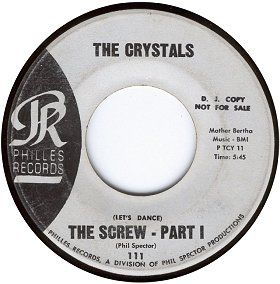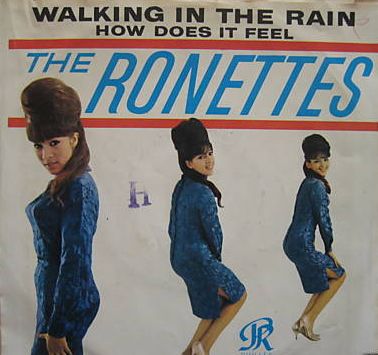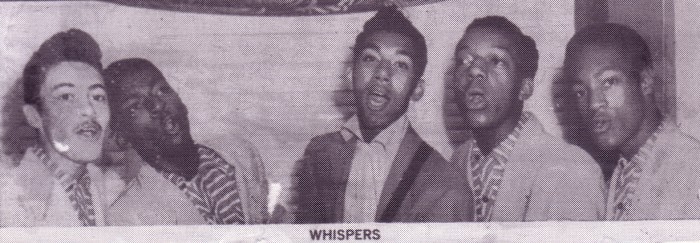This week, I happened to borrow the “Phil Spector: Back To Mono” 4-CD box set from my local public library. It traces his career from his earliest works in the late fifties to the rise of his legendary imprint Philles Records. I have many of the original 45s featured on the set, but I thought it would be nice to have pristine digital copies of those songs, so I began to rip away track after fabulous track. Phil Spector is one of my heroes. And there were several songs I had never heard before getting hold of this set.
The project is fairly exhaustive, but I was surprised at some of the things that were omitted. The story of his legendary business tactic is well known, and it includes the commercially unavailable record by his signature group The Crystals called “(Let’s Dance) The Screw” which is currently known to exist only has a handful of DJ copies and one stock copy. This was pressed to get out of a contractual obligation to his partner, and is highly sought after by collectors. It’s been bootlegged a gazillion times and odds are if you run across a copy of it, it is counterfeit. I don’t have a copy, but an original looks like this:

At this writing, I don’t have an mp3 of that track to include, but I would be happy to link to one if any of you can point me to a copy on line.
Another oddly omitted track is the amazing B-Side of the Ronettes Walking In The Rain hit single, called How Does it Feel?


[audio:http://www.paulcollegio.net/juke/divas/bunny01.mp3]
While I love the Ronettes – and who wouldn’t what with those fabulous towering hairdos and sweater-piercing cone-bras – Ronnie Spector’s vibrato just reminds me of Kathryn Hepburn in the latter stages of Parkinson’s disease. Finally having said that, this is one of my favorite Ronettes songs evah and perhaps their most avant garde production, given that stressed out horn section and nightmarish background vocal arrangement. It’s the flip side of another of their big hits, (I said HITS) ‘Walking in the Rain’.
Phil Spector is pretty much unanimously given credit for the invention of the “Wall of Sound”, and his signature sound has had enormous impact on the direction of pop music over the last four decades. And credit is definitely due. But he was definitely influenced by certain sounds happening in the R&B world over the previous years, and these records definitely poured the foundation for the Wall of Sound. I think astute listeners will be very able to trace his influences back to a decade before his earliest releases, to a man named Terry Johnson.
Terry began his recording career with an obscure Baltimore based vocal group called The Whispers in the early 1950s. They only recorded two singles for Philadelphia’s Gotham Records label. One of them, “Are You Sorry” is just an amazing example of group sound, and only a handful of elite collectors really know about it. The harmonies and arrangements are innovative and breathtaking…all arranged by then 16-year old Terry Johnson. Click below to hear it.

The Whispers – Are You Sorry
[audio:http://www.paulcollegio.net/juke/juke0506/doowop.mp3]
After the Whispers fell apart, Terry managed to hook up with the Flamingos and by 1958 was one of the lead duet singers in “Lovers Never Say Goodbye”. Terry did the arrangement on virtually all of the singles the Flamingos recorded for George Goldner’s End label.
Perhaps the most recognizable song from The Flamingos is their 1959 version of the classic I Only Have Eyes For You. This is the focal point, the song that I believe inspired Phil Spector and pushed him toward developing and evolving The Wall of Sound. This was a process in The Flamingos music that was developing over the years, but it was Terry Johnson who made it gel with songs like Lovers Never Say Goodbye, Mio Amore and many others. But it is in I Only Have Eyes For You is where the concept is really spot-on.
[audio:http://www.jukeboxheart.com/screamers/spector/Flamingos_eyes.mp3]
Terry ultimately landed Motown Records as an artist and producing partners with Smokey Robinson. As an artist, he recorded several records on the Gordy Label. He wrote, arranged, and produced songs for Smokey Robinson & The Miracles, The Supremes, The Four Tops, The Temptations, Martha Reeves & The Vandellas, Edwin Starr, The Spinners, Bobby Taylor & the Vancouvers, Jimmy Ruffin, Mickey Denton, Blinky and other Motown artists.
